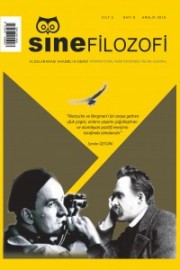Toni Erdmann Filminde Modern Yaşam Paradoksları, Alt Politika ve Oyun
Modern Life Paradoxs, Infrapolitics and Play in Toni Erdmann
Author(s): Özge Güven AkdoğanSubject(s): Political Theory, Film / Cinema / Cinematography
Published by: Serdar Öztürk
Keywords: modernism; Toni Erdmann; infrapolitics; play-element;
Summary/Abstract: In this study, Toni Erdmann (2016), directed by Maren Ade, is examined with a focus on the paradoxical elements of modernism. Competitive business relationships, the emotional complexities of the modern individual, the paradoxical points where individualization and rationalism come to the extreme can lead to loss of playfulness and humor in everyday life. In this study, the cinematic images that can be related to these points in the film are examined in the context of the sub-policy concept emphasized by James S. Scott. In modern life, upper politics focuses on power, institutional structures and materialism, while lower politics focuses on humor, play, the carnival world and the ordinary. At this point, cinematographic images in the film are analyzed in the context of Johan Huizinga’s conceptual framework in which he explores the playful elements in life. The study is important in that it focuses on the paradoxes of modernism presented by cinematographic images. As a result, thematic and cinematographic preferences of the film are revealed in its point presentation of the reasoning and playfulness, in the other words, the upper politics and sub politics. It is further emphasized that individuals who form their outlook on life in the corporate world keep a distance even from laughing.
Journal: SineFilozofi
- Issue Year: 4/2019
- Issue No: 8
- Page Range: 266-283
- Page Count: 18
- Language: Turkish

